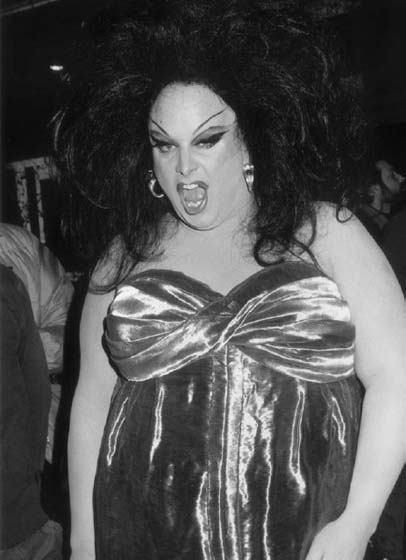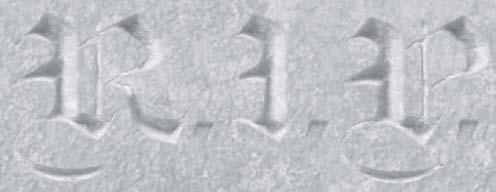The Encyclopedia of Dead Rock Stars (116 page)
Read The Encyclopedia of Dead Rock Stars Online
Authors: Jeremy Simmonds

See also
Jackie Wilson ( January 1984)
January 1984)
Lest We Forget
Other notable deaths that occurred sometime during 1987:
Diane L Adams
(US country singer who hit with ‘I’m Little but I’m Loud’; born 4/10/1962; car crash, 4/4)
Hugh Bryant
(US baritone with veteran vocal quartet The Delta Rhythm Boys; the fifth member of the group to pass on, he dropped dead on the spot after singing at Otha Lee Gaines’s funeral, 7/1987)
Tony ‘Stix’ Destra
(US rock drummer with Philadelphia-based ‘hair metal’ acts Cinderella and Britny Fox; born 20/9/1954; car accident, 8/2)
Joe DeZuniga
(US singer/guitarist with California death-metallers Insanity; heart disease, 16/5)
Howie Johnson
(original drummer with pioneering US surf/garage instrumentalists The Ventures; born 1938; heart attack, 5/8)
Major Worries
(Jamaican dancehall DJ; born Wayne Jones; shot dead near his Spanish Town home)
David Martin
(US bassist with The Tom Toms and garage rockers Sam the Sham & The Pharaohs, who hit big with ‘Wooly Bully’ (1965) and ‘Li’l Red Riding Hood’ (1966); born Texas, 1937; heart attack, 2/8)
Adriel McDonald
(US member of vocal group The Ink Spots; born 10/5/1905; unknown, 1/9)
Oliver North
(not that one - US singer/guitarist with sharp newwave trio The Comateens, formed with his brother Nic; born New York; unknown, 6/87)
Konrad ‘Conny’ Plank
(noted German ‘Krautrock’ producer who introduced the world to Kraftwerk and also produced Devo, Brian Eno, Eurythmics, Killing Joke and Ultravox; born
c
1940; cancer, 12/1987)
Snakefinger
(UK guitarist/violinist with bluesrockers Chilli Willi & The Red Hot Peppers and avantgarde act The Residents; born Philip Lithman, London, 17/6/1949; heart attack, in Austria, 1/7)
Ted Taylor
(US falsetto with vocal troupes Santa Monica Soul Seekers and The Cadets, who scored a 1956 Top Twenty hit with ‘Stranded in the Jungle’; born Austin Taylor, Oklahoma, 16/2/1934; car crash, 22/10)
1988
MARCH
Monday 7
Divine
(Harris Glenn Milstead - Baltimore, Maryland, 19 October 1945)

The undisputed larger-than-life Queen of High-NRG, cross-dressing Divine stomped his way out of the closet and into the discos of both the USA and Europe, recording a number of sweaty mini epics during the early to mid eighties. He became infamous twenty years earlier, however, as a high-school friend of would-be film-maker John Waters, and the latter was more than happy to indulge this burgeoning curio’s penchant for outlandish women’s clothing, selecting Milstead (who had, to all intents and purposes, already become ‘Divine’) for his first pictures. Divine was – fittingly – still working as a hairdresser when cast in
Roman Candles
and
Eat YourMakeUp.
As Waters’s work flourished, Divine found himself thrown into more and more outrageous roles, such as the ‘poodle-shit-eating’ Babs Johnson in
Pink Flamingos
(1972) and porno-grapher’s wife Francine Fishpaw in 1981’s
Polyester.
Divine had a definite comic talent, which was not tempered after he launched his recording career. While early disco-flavoured moments like ‘Born to be Cheap’ (1979) and ‘Shoot Your Shot’ (1982) had marginal appeal, 1983’s ‘Love Reaction’ was a massive New York dancefloor favourite. The melody and rhythm were obviously borrowed from New Order’s ‘Blue Monday’, but the Manchester band didn’t mind and paid tribute to Divine thereafter. The following year saw the unlikely vision of Divine on
Top of the Pops
with the UK Top Twenty success of ‘You Think You’re a Man’ – though the stilted Stock, Aitken & Waterman productions made the novelty pall somewhat by 1985; a brash cover of The Four Seasons’ ‘Walk Like a Man’ was Divine’s only significant further hit. But at the beginning of 1988, John Waters’
Hairspray
was released (Divine’s performance as crass stage-mom Edna Turnbladt is generally considered his best) and all seemed back on course – particularly with a part in the popular mainstream US sitcom
Married
. .
. with Children
also set to start.

Simply Divine, darling!
On the evening of 6 March, Divine had dined on pasta and treated those gathered at the Los Angeles Regency Hotel to an impromptu version of
‘Arrivederci Roma’.
The following morning, however, he was expected on set and alarm bells began to ring when he didn’t show. At noon, his manager, Bernard Jay, entered Room 261 to find Divine dead in his bed. The star, having ballooned to almost 370 lbs, had died in his sleep from an enlarged heart. Divine’s Baltimore funeral was attended by many, and flowers arrived from a host of showbiz acquaintances (not least Elton John); his hearse was given police accompaniment. Divine had been reconciled with his mother, Frances Milstead, after a long period of estrangement, just before he died.
Thursday 10
Andy Gibb
(Manchester, 5 March 1958)

Often mooted as a fourth Bee Gee, youngest Gibb brother Andy was undaunted by his brothers’ staggering success, following impressively in their considerable wake. Both Gibb parents had been musicians, so it was unsurprising when their boys followed suit; Andy Gibb was just six months old when the family upped sticks to live in Australia, where all would perform regularly on the club circuit. In 1967, the sudden international success of older brothers Barry, Robin and Maurice was such that the family relocated themselves twice more, winding up on the Isle of Wight, where Gibb formed his first band in 1973. In 1975, he returned to Australia, where, like his brothers, one could say that he was something of a hit. An early single, ‘Words and Music’ became a local smash and was heard by entrepreneur Robert Stigwood, who flew Gibb to Miami to cut an album with (naturally) his brother Barry, then enjoying multiplatinum success with The Bee Gees’
Saturday Night Fever
involvement. The response to Andy Gibb’s soaring falsetto in America was phenomenal, and his first three singles all hit number one. That the songs bore a strong similarity to the work of his siblings mattered not – the Gibb brothers (in their various guises) were the hottest property of all and pretty much everything they touched turned platinum. Indeed, there were shades of Beatle-like US domination as Gibb bridged number-one hits by The Bee Gees with his own ‘Love is Thicker than Water’ (1978). Clearly this level of success could not continue indefinitely, and by 1980 Gibb’s star was beginning to fade. (In his homeland, consistent success had been significantly harder to find from the start, though 1978’s ‘An Everlasting Love’ had scraped the UK Top Ten.) After 1981, Gibb turned his attention to acting, but following a problematic and very public relationship with
Dallas
actress Victoria Principal, the previously married star dealt with their inevitable split by taking vast quantities of cocaine. As a result, he was relieved of the lead role in a Broadway production of
Joseph and the Amazing Technicolor Dreamcoat,
entering the infamous Betty Ford Clinic in 1985, Gibb took two years to kick his habit. In early 1988, the singer – now apparently clean – learned he was close to bankruptcy and fled to the UK. Bailed out by a new deal with Island, Gibb was spurred on to write again (from the seclusion and comfort of brother Robin’s Oxfordshire mansion), his new material supposedly revealing a new, ‘mature’ approach to pop music. But, frustrated by his inability to compose unaided, Gibb hit the bottle hard. Just after celebrating his thirtieth birthday, he complained of chest pains and was admitted to Oxford’s John Radcliffe Hospital; he would not leave alive. Early on the morning of 10 March, Andy Gibb was awoken by an intern who wanted to take his blood. Gibb agreed, sighed and passed away. Although many were quick to blame his premature death on drug abuse, a post mortem revealed that Gibb – whose heart was dangerously enlarged – had died from the viral infection myocarditis. His body was flown back to Los Angeles for interment.
